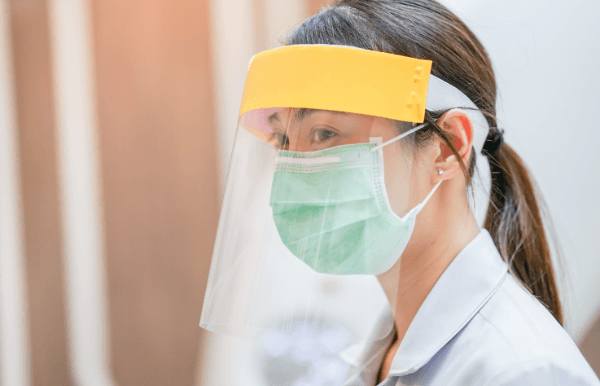
This post is for the healthcare professionals currently struggling with the effects of personal protective equipment (PPE), in particular face masks. I have had a large number of requests for skincare tips from the front-line and am keen to help where I can. I will caveat that there is limited published scientific data on the dermatological issues many are experiencing, and much of the information we have comes from the SARS outbreak in 2003 and PPE use at the time, in particular N95 masks (the closest British equivalent in terms of filtering airborne particles to this is the FFP-2 mask).
Prolonged contact to PPE and mask wearing can lead to a number of recognised skin problems including:
- Pressure injury
- Contact dermatitis or eczema
- Itch
- Pressure urticaria (or ‘hives’)
- Exacerbation of acne
These issues occur for a variety of reasons. Acne can be driven by the hot, humid microclimate created in facial areas covered by the mask alongside occlusion of the pilosebaceous (oil producing) ducts due to local pressure on the skin. At the other extreme, itch and rash are possible due to irritant eczema from mask components. There have also been reported cases of allergy to mask adhesives or components such as rubber straps. In these circumstances the skin will appear red, inflamed, scaly and flaky. Lastly, direct pressure-related effects are also common, resulting in redness (often across the nasal bridge) and skin maceration.
So what can you do?
Well, this partly depends on the symptoms you are facing. In general terms, ensuring the skin is cleansed thoroughly and well-moisturised may help relieve some of the symptoms of discomfort such as burning or stinging. Aim to cleanse and moisturise at least twice daily (morning and evening).
For acne flare-ups:
- Use a facewash with salicylic acid (eg La Roche Posay Effaclar foaming wash, Medik8 clarifying foam)
- Use targeted spot treatment (eg, Murad blemish control) OR a salicylic acid toner after cleansing (eg Paula’s choice 2% liquid exfoliant)
- Apply a fragrance-free, non-comedogenic moisturiser
- If there is no improvement with the above seek medical attention for prescription agents, eg topicals such as Epiduo (retinoid and benzoyl peroxide) or adapalene
For itching or eczema type rash:
- Use unscented facial cleansers designed for sensitive skin (eg La Roche Posay Toleriane dermatocleanser or Cerave hydrating cleanser)
- Make use of barrier creams (eg Aquaphor healing ointment or vaseline) overnight on any broken or macerated areas of skin as an occlusive
- Use fragrance-free moisturisers (eg Cetaphil hydrating moisturiser or Avene skin recovery cream) on the rest of the skin twice daily to prevent water loss and improve the barrier function of the skin
- Purchase some OTC eumovate cream 0.05% (mild steroid) and apply to itchy, inflamed skin twice daily for 7 days
- If no improvement then seek medical attention as you may require prescription agents
- Avoid harsh scrubs or chemical exfoliators if the skin is red or sensitive as this may worsen eczema. Take a break from these and retinols which may otherwise form part of your regular skincare routine whilst there is a facial rash present.
Other general tips:
- Do not use a barrier cream immediately prior to fitting your PPE as it may affect the quality of the seal. We need more data and guidelines on this.
- Avoid wearing heavy make-up, especially foundation, underneath the mask as it may lead to spots
- If you are using water with a foaming gel cleanser then check the water temperature is luke-warm; hot water may irritate the skin further
- Pat your skin dry after washing rather than rubbing it with a towel
- Where possible, remove pressure from the mask every 1-2 hours
- Take regular daily non-sedating antihistamines if you are getting ‘hives’
Note – There is no conflict of interest in product recommendations. This is all non-sponsored. For further reading I shall leave some references that have formed the basis of this post. Skin issues are likely under-reported in the scientific literature as masks are essential in certain situations and there is no choice but to wear them; many therefore do not seek medical attention and the numbers are often not recorded accurately. Lastly, this is a stock photo – I am fully aware that the picture is not of an N95 mask!! To every healthcare professional dealing with coronavirus at present, take care and stay safe.
This article is for information only and should not be used for the diagnosis or treatment of medical conditions. myHealthSpecialist makes no representations as to the accuracy or completeness of any of the information in this article or found by following any link from this article. Please consult a doctor or other healthcare professional for medical advice.

Dr Anjali Mahto, Consultant Dermatologist
Book an appointment with Dr Anjali Mahto